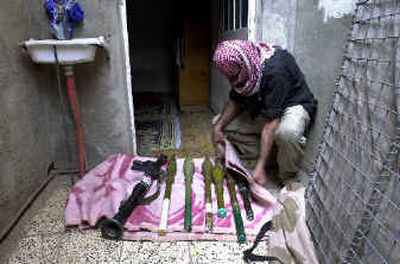Al-Sadr backers turning in arms

BAGHDAD, Iraq – With nervous looks on their faces and small arsenals in their cars, supporters of rebel cleric Muqtada al-Sadr trickled into Iraqi police stations Monday to surrender weapons as part of a government agreement to end weeks of fighting in Baghdad’s dense and dangerous Sadr City quarter.
The day was hailed as a “good beginning” by Iraqi police and al-Sadr aides, though the government of interim Prime Minister Ayad Allawi still faces widespread violence and an escalating hostage crisis.
An American soldier and two Iraqis died when a car bomber blew himself up near a passing U.S. military convoy Monday morning in the northwest city of Mosul, a military spokesman said. Nine American soldiers were among at least 18 people wounded, but the military said six of the soldiers returned to duty.
In western Iraq, U.S. Marines called in air support after insurgents they were battling near the town of Hit holed up in a mosque, a military spokesman said. Airstrikes left the mosque ablaze, which is sure to outrage residents caught between intimidation from insurgents and the American offensive.
Iraq’s brazen hostage-takers struck again, releasing a video that showed the beheadings of a Turkish contractor and his Kurdish translator, according to the Arabic-language al-Jazeera television network, which had obtained the tape. Another Turkish hostage, identified as a truck driver, appeared in a separate video in which hooded gunmen threatened to kill him within three days unless the U.S. military releases Iraqi prisoners and Turkish companies withdraw from Iraq.
Guerrillas, mostly Sunni Muslim extremists, have kidnapped more than 150 foreigners in Iraq. They’ve killed at least 28 hostages; most of the others were freed on ransom or released after religious and political figures intervened.
Two members of Allawi’s government traveled Monday to the southern holy city of Najaf to visit the offices of Grand Ayatollah Ali al-Husseini al-Sistani, the most prominent Shiite Muslim cleric in Iraq. Iraqi Vice President Ibrahim al-Jaafari said the trip was to offer assurances that elections will proceed as scheduled despite the dismal security conditions.
The first day of the Sadr City weapons-for-cash exchange, designed to bring stability to the volatile Shiite slum before January’s elections, netted several hundred mortar rounds and machine guns and a small amount of bomb-making material, Iraqi national guardsmen said.
That’s only a small fraction of the weaponry to be found among Sadr City’s 2.5 million residents, but militants have four more days to turn in their weapons. In exchange, the Iraqi government has promised not to prosecute members of al-Sadr’s militia, to release some imprisoned al-Sadr supporters and to halt a U.S.-led offensive in the area.
The American military has dismissed previous weapons drives as ineffective at bringing in the deadliest arms, and Iraqi police and national guardsmen, who often are outgunned in their clashes with militants, say the district is still awash with weapons.
Police barricaded roads and Iraqi national guardsmen watched from rooftops as cars arrived intermittently throughout the day, carrying rebels ready to swap grenade launchers for $170, sniper rifles for more than $500 and machine guns for more than $50 apiece, according to a police price list. Mortar rounds, land mines and hand grenades went for much less.
“Look at this. It’s what they use for IEDs,” one guardsman said, displaying the TNT paste used in the improvised explosive devices that dot the streets of Sadr City.
At the Habibiya police station in Sadr City, a white Caprice drove up to a checkpoint and the driver, a nervous-looking young man in a red shirt, opened his trunk to reveal 30 hand grenades, 25 mortar rounds and 15 machine guns.
Police escorted 25-year-old Ali Mohamed past the blockades and began unloading and counting his stash. While waiting for his payment, Mohamed said he was certain he’d made the prudent decision.
“This is 100 percent right,” he said. “I believe that the two parties will stick to the agreement they promised.”